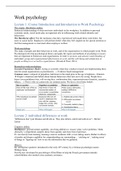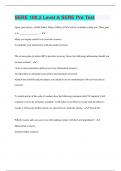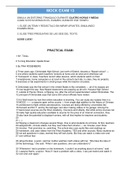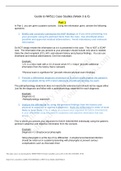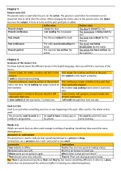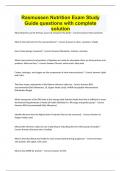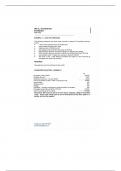Work psychology
Lecture 1: Course Introduction and Introduction to Work Psychology
The origins: Hawthorne studies:
Enhanced understanding of what motivates individuals in the workplace. In addition to personal
economic needs, social needs play an important role in influencing work-related attitudes and
behaviours.
The Hawthorne effect: Not the mechanics that they experienced with made them work better, but
more to social factor. Employees will perform better when they feel singled out for special attention or
feel that management is concerned about employee welfare.
Work psychology
The study of people and their behaviour at work, and of the organizations in which people work; Work
Psychologists develop psychological theory and apply the rigour and methods of psychology to issues
that are important to businesses and organizations, in order to promote and advance understanding of
individual, group and organizational effectiveness at work, and the well-being and satisfaction of
people working in or served by organizations. (Woods & West, 2014)
Research in work psychology:
Scientist-Practitioner Model: Acting as scientists when they conduct research and implementing these
into the actual organizations as practitioners. → Evidence based management
Common sense: a deposit of prejudices laid down in the mind prior to the age of eighteen ~ Einstein
→ People’s intuitions and beliefs about human behaviour often turn out to be wrong. People have
biases (overconfidence bias, self-serving bias, confirmation bias, representativeness heuristic, narrative
fallacy, …) This is why we cannot rely on common sense. We have a lot of false beliefs
Lecture 2: individual differences at work
“differences don’t just threaten and divide us. They also inform, enrich and enliven us”~ Harriet
Lerner
Cognitive ability:
Intelligence: general mental capability, involving abilities to: reason / plan / solve problems / think
abstractly / comprehend complex ideas/ learn quickly and learn from experience.
It’s not merely book learning, learning a narrow academic skill, or test-taking smarts. Rather it reflects
a broader and deeper capability for comprehending our surroundings – ‘catching-on’, ‘making sense’
of things or ‘figuring out’ how to use the information that we gathered.
History:
IQ: intelligence quotient: introduced in the early 20th century by a German psychologist names
William Stern.
First IQ test: developed by psychologist Alfred Binet to help the French government identify
schoolchildren who needed extra academic assistance.
, ➔ Both of them found this a too simplistic measure of intelligence. So multi types of intelligence
Models of intelligence
Model of verbal- & spatial intelligence ~ Vernon
- Verbal intelligence: being able to be very good with
reading/hearing/speaking/writing/debating/discussion (e.g. managers/politicians etc.)
- Spatial/mechanical intelligence: being very goof at drawing/building/design/mazes &
puzzles/looking at pictures/imagining (e.g. engineers/artists etc.)
→ later on, more types of intelligence added.
Model of crystalized- & fluid ability ~ Cattel:
- Crystalized ability: the knowledge that you gain through learning and experience (e.g. when
you start the job this ability is more important)
- Fluid ability: ability to adapt to new unexpected situations, to solve new problems as they
arise (e.g. more important as you progress throughout your career).
Spearman’s G
Big correlation/overlap of performance of different tasks due to an underlying factor → “g”.
exception is autism in which a person can really excel in some characteristics and not in others. But
most people if they’re good at one thing, are probably good at other things.
Cognitive ability at work:
Does cognitive ability matter?
- Meta analysis (1984): correlation between general cognitive ability and performance of 0.50
for complex jobs and 0.23 for low-complexity jobs
- Meta analysis Europe (2003): correlations between general cognitive and job performance and
training success of 0.54
➔ Helps acquire job knowledge better and faster.
Personality:
Theories of personality: Focus on individual differences in behaviour, thought and emotion
Assumed to be:
- Internal: not immediately noticeable
- Stable: it stays the same (unchanged overtime)
- consistent (apply across different situations)
- different: you can distinguish people on their personality
A lot of these assumptions cannot really be made strong.
Effects of situations:
- traits are coherent responses to particular situational cues
- people behave differently in different situations e.g. home and work (so not consistent)
Models of personality:
The Myers-Briggs Type indicator: most widely used. Poor validity & restrictive categories
Developed by a mother and a daughter (not psychologists) → 4 categories you can put people in:
Based on a preference on each of the four dimensions we get 16 possible personality types
,The book “profiles of genius” looked at 13 successful business people (all men) – all of them were
N/T’s which make up 5% of the population and include Bill Gates, Steve Jobs, Soichihiro Honda, Ted
Turner
Critics:
- there is very little evidence that Myers-Briggs is a valid measure of personality: self reported /
poor validity / poor reliability / dichotomies are not always independent / not comprehensive
(does not account for every personality dimension e.g. neuroticism)
- It puts you either in 1 category or the other, but in real life you can also score somewhere in
the middle.
- Also the results can be different depending on your mood. You can get a different letter
combination
- Results can be different in other context e.g. friendship/work/school
The Big Five: The most widely researched. The most valid model of personality (OCEAN) = good
predictive validity, but not a strong theoretical basis and no high reliability.
- Openness to experience:
o Pro’s: Creative, intellectually curious, imaginative and have broad interests
o Con’s: Engages in risky behaviour, more work accidents
- Conscientiousness
o Pro’s: Reliable, orderly, responsible, self-disciplined
o Con’s: Can be rigid, not creative
- Extraversion:
o Pro’s: Outgoing, assertive, good with people
o Con’s: Not good with solitary job’s, virtual work
- Agreeableness
o Pro’s: Friendly, eager to help, cooperative
o Con’s: Conflict avoidant, not critical
- Neuroticism/emotional stability
o Pro’s: Motivated to work really hard, goal-oriented in teams
o Con’s: Insecure, unstable, anxious, negative
Looking at facial features:
New research, so not very reliable, not enough studies
Volunteer participants (N=12,447) provided their face photographs
(31,367 images) and completed a self-report measure of the Big Five
traits. We trained a cascade of artificial neural networks (ANNs) on a
large labelled dataset to predict self-reported Big Five scores. The highest
correlations between observed and predicted personality scores were
found for conscientiousness (0.360 for men and 0.335 for women) and the
mean effect size was 0.243. (Kachur et al., 2020)
Criticism of the Big Five:
- Atheoretical: no theory that these 5 dimensions are the most important ones
- Self-reported:
- Different results based on context/timing
- More/less dimensions? → Big Six (HEXACO): honesty-humility (newest personality test)
Can Facebook predict your personality?:
Based on your likes, Facebook can predict your: Age/Sexual orientation & Gender/Ethnicity/Religious
and political views/Personality/Intelligence/Happiness
Based on 10 likes they know you as good as a colleague, 70: friend, 150: family, 300: partner
Personality differences:
Does personality matter?
, - Predicts job performance – depending on job requirements
- Certain traits are related to job satisfaction an commitment
- Occupational interests
- Team processes
- Leadership behaviour
Dynamic and developmental model of personality at work
Some issues with the literature on personality and work outcomes:
- relations of personality traits with work outcomes are considered static
- personality is always considered a predictor
→ Recent evidence suggests personality may affect work behaviour and also be affected by work
→ Trait Activation Theory (TAT) proposes behaviour results from an interaction between person and
situation
Influences of personality on job performance change overtime
- performance demands change
Ways work might affect personality development
- normative change
- deepening and strengthening of traits: selecting environments/work places can strengthen our
good traits
- unique experiences: e.g. experiencing a burn-out can alter they way you are in the workplace
Dynamic developmental model (Woods et al.)
- Personality traits in constant interaction with work-related activities and environments
- Traits influence career choices
- As demands change, different traits influence performance and behaviour, and work becomes
a core part of who we are
Final note on cognitive ability:
- Performance at work increases linearly in early stages of the job then plateaus following
‘learning curve’
- Cognitive ability critical in learning phase
- Over time motivational aspects become more important
Performance and Individual Differences
A performance trajectory curve (learning curve) and influence of individual differences at different
times
Conclusion:
- Cognitive ability and personality matter
- They influence a range of work related outcomes - performance, commitment, satisfaction,
OCB, CWB...
- The effect of cognitive ability and personality on work performance is not stable
- Heavily dependent on the context of the job/organisation and timing
- Work can also influence our ability and personality
Lecture 1: Course Introduction and Introduction to Work Psychology
The origins: Hawthorne studies:
Enhanced understanding of what motivates individuals in the workplace. In addition to personal
economic needs, social needs play an important role in influencing work-related attitudes and
behaviours.
The Hawthorne effect: Not the mechanics that they experienced with made them work better, but
more to social factor. Employees will perform better when they feel singled out for special attention or
feel that management is concerned about employee welfare.
Work psychology
The study of people and their behaviour at work, and of the organizations in which people work; Work
Psychologists develop psychological theory and apply the rigour and methods of psychology to issues
that are important to businesses and organizations, in order to promote and advance understanding of
individual, group and organizational effectiveness at work, and the well-being and satisfaction of
people working in or served by organizations. (Woods & West, 2014)
Research in work psychology:
Scientist-Practitioner Model: Acting as scientists when they conduct research and implementing these
into the actual organizations as practitioners. → Evidence based management
Common sense: a deposit of prejudices laid down in the mind prior to the age of eighteen ~ Einstein
→ People’s intuitions and beliefs about human behaviour often turn out to be wrong. People have
biases (overconfidence bias, self-serving bias, confirmation bias, representativeness heuristic, narrative
fallacy, …) This is why we cannot rely on common sense. We have a lot of false beliefs
Lecture 2: individual differences at work
“differences don’t just threaten and divide us. They also inform, enrich and enliven us”~ Harriet
Lerner
Cognitive ability:
Intelligence: general mental capability, involving abilities to: reason / plan / solve problems / think
abstractly / comprehend complex ideas/ learn quickly and learn from experience.
It’s not merely book learning, learning a narrow academic skill, or test-taking smarts. Rather it reflects
a broader and deeper capability for comprehending our surroundings – ‘catching-on’, ‘making sense’
of things or ‘figuring out’ how to use the information that we gathered.
History:
IQ: intelligence quotient: introduced in the early 20th century by a German psychologist names
William Stern.
First IQ test: developed by psychologist Alfred Binet to help the French government identify
schoolchildren who needed extra academic assistance.
, ➔ Both of them found this a too simplistic measure of intelligence. So multi types of intelligence
Models of intelligence
Model of verbal- & spatial intelligence ~ Vernon
- Verbal intelligence: being able to be very good with
reading/hearing/speaking/writing/debating/discussion (e.g. managers/politicians etc.)
- Spatial/mechanical intelligence: being very goof at drawing/building/design/mazes &
puzzles/looking at pictures/imagining (e.g. engineers/artists etc.)
→ later on, more types of intelligence added.
Model of crystalized- & fluid ability ~ Cattel:
- Crystalized ability: the knowledge that you gain through learning and experience (e.g. when
you start the job this ability is more important)
- Fluid ability: ability to adapt to new unexpected situations, to solve new problems as they
arise (e.g. more important as you progress throughout your career).
Spearman’s G
Big correlation/overlap of performance of different tasks due to an underlying factor → “g”.
exception is autism in which a person can really excel in some characteristics and not in others. But
most people if they’re good at one thing, are probably good at other things.
Cognitive ability at work:
Does cognitive ability matter?
- Meta analysis (1984): correlation between general cognitive ability and performance of 0.50
for complex jobs and 0.23 for low-complexity jobs
- Meta analysis Europe (2003): correlations between general cognitive and job performance and
training success of 0.54
➔ Helps acquire job knowledge better and faster.
Personality:
Theories of personality: Focus on individual differences in behaviour, thought and emotion
Assumed to be:
- Internal: not immediately noticeable
- Stable: it stays the same (unchanged overtime)
- consistent (apply across different situations)
- different: you can distinguish people on their personality
A lot of these assumptions cannot really be made strong.
Effects of situations:
- traits are coherent responses to particular situational cues
- people behave differently in different situations e.g. home and work (so not consistent)
Models of personality:
The Myers-Briggs Type indicator: most widely used. Poor validity & restrictive categories
Developed by a mother and a daughter (not psychologists) → 4 categories you can put people in:
Based on a preference on each of the four dimensions we get 16 possible personality types
,The book “profiles of genius” looked at 13 successful business people (all men) – all of them were
N/T’s which make up 5% of the population and include Bill Gates, Steve Jobs, Soichihiro Honda, Ted
Turner
Critics:
- there is very little evidence that Myers-Briggs is a valid measure of personality: self reported /
poor validity / poor reliability / dichotomies are not always independent / not comprehensive
(does not account for every personality dimension e.g. neuroticism)
- It puts you either in 1 category or the other, but in real life you can also score somewhere in
the middle.
- Also the results can be different depending on your mood. You can get a different letter
combination
- Results can be different in other context e.g. friendship/work/school
The Big Five: The most widely researched. The most valid model of personality (OCEAN) = good
predictive validity, but not a strong theoretical basis and no high reliability.
- Openness to experience:
o Pro’s: Creative, intellectually curious, imaginative and have broad interests
o Con’s: Engages in risky behaviour, more work accidents
- Conscientiousness
o Pro’s: Reliable, orderly, responsible, self-disciplined
o Con’s: Can be rigid, not creative
- Extraversion:
o Pro’s: Outgoing, assertive, good with people
o Con’s: Not good with solitary job’s, virtual work
- Agreeableness
o Pro’s: Friendly, eager to help, cooperative
o Con’s: Conflict avoidant, not critical
- Neuroticism/emotional stability
o Pro’s: Motivated to work really hard, goal-oriented in teams
o Con’s: Insecure, unstable, anxious, negative
Looking at facial features:
New research, so not very reliable, not enough studies
Volunteer participants (N=12,447) provided their face photographs
(31,367 images) and completed a self-report measure of the Big Five
traits. We trained a cascade of artificial neural networks (ANNs) on a
large labelled dataset to predict self-reported Big Five scores. The highest
correlations between observed and predicted personality scores were
found for conscientiousness (0.360 for men and 0.335 for women) and the
mean effect size was 0.243. (Kachur et al., 2020)
Criticism of the Big Five:
- Atheoretical: no theory that these 5 dimensions are the most important ones
- Self-reported:
- Different results based on context/timing
- More/less dimensions? → Big Six (HEXACO): honesty-humility (newest personality test)
Can Facebook predict your personality?:
Based on your likes, Facebook can predict your: Age/Sexual orientation & Gender/Ethnicity/Religious
and political views/Personality/Intelligence/Happiness
Based on 10 likes they know you as good as a colleague, 70: friend, 150: family, 300: partner
Personality differences:
Does personality matter?
, - Predicts job performance – depending on job requirements
- Certain traits are related to job satisfaction an commitment
- Occupational interests
- Team processes
- Leadership behaviour
Dynamic and developmental model of personality at work
Some issues with the literature on personality and work outcomes:
- relations of personality traits with work outcomes are considered static
- personality is always considered a predictor
→ Recent evidence suggests personality may affect work behaviour and also be affected by work
→ Trait Activation Theory (TAT) proposes behaviour results from an interaction between person and
situation
Influences of personality on job performance change overtime
- performance demands change
Ways work might affect personality development
- normative change
- deepening and strengthening of traits: selecting environments/work places can strengthen our
good traits
- unique experiences: e.g. experiencing a burn-out can alter they way you are in the workplace
Dynamic developmental model (Woods et al.)
- Personality traits in constant interaction with work-related activities and environments
- Traits influence career choices
- As demands change, different traits influence performance and behaviour, and work becomes
a core part of who we are
Final note on cognitive ability:
- Performance at work increases linearly in early stages of the job then plateaus following
‘learning curve’
- Cognitive ability critical in learning phase
- Over time motivational aspects become more important
Performance and Individual Differences
A performance trajectory curve (learning curve) and influence of individual differences at different
times
Conclusion:
- Cognitive ability and personality matter
- They influence a range of work related outcomes - performance, commitment, satisfaction,
OCB, CWB...
- The effect of cognitive ability and personality on work performance is not stable
- Heavily dependent on the context of the job/organisation and timing
- Work can also influence our ability and personality


